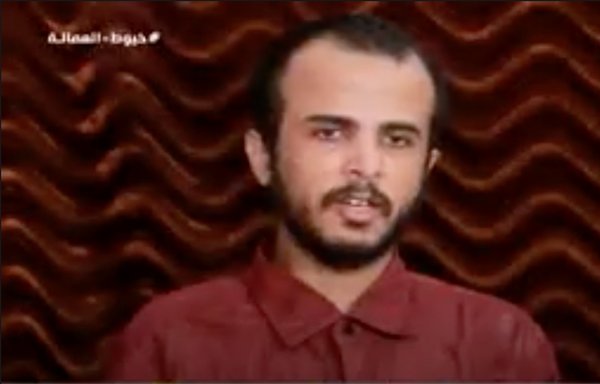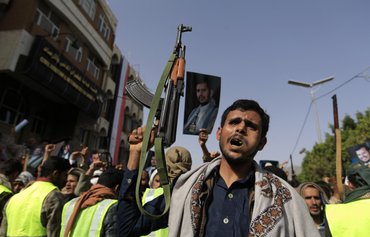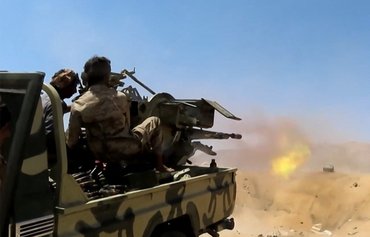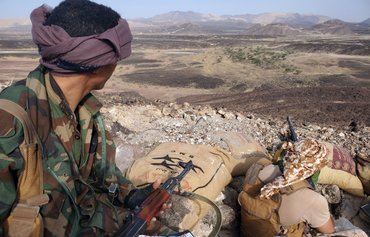In a video broadcast Saturday (December 5th) by Yemen's Ministry of Defence, a captured Houthi spy reveals that Iranian and Iraqi experts are involved in terrorist crimes against women, children and ministry officials in the country.
The documentary -- Khoyout al-Amala (Threads of Treason) -- features the confessions of Bassem al-Samet, a member of a cell affiliated with the Iran-backed Houthis' (Ansarallah) missile unit.
Al-Samet reveals that the cell, busted by military and security agencies in Marib, was trained by Iranian and Iraqi experts who oversee the missile unit.
He said the unit deliberately targets children and women, as well as military graduation ceremonies and defence ministry officials, with ballistic missiles.
![Captured Houthi spy Bassem al-Samet revealed in a recent documentary that Iranian and Iraqi experts are involved in training the Houthis' missile unit, which is responsible for attacks targeting civilians, and military and government officials. [Still from video 'Khoyout al-Amala']](/cnmi_am/images/2020/12/07/27346-iranian-experts-yemen-600_384.jpg)
Captured Houthi spy Bassem al-Samet revealed in a recent documentary that Iranian and Iraqi experts are involved in training the Houthis' missile unit, which is responsible for attacks targeting civilians, and military and government officials. [Still from video 'Khoyout al-Amala']
According to the documentary, al-Samet received special training at the Houthis' Security and Intelligence Agency in Sanaa at the hands of three commanders: two Iraqis and one Iranian.
"I was trained on how to monitor co-ordinates using special equipment and modern applications in Farsi," al-Samet said, adding that he gave the co-ordinates of an October 2019 meeting in Marib attended by Defence Minister Mohammed Ali al-Maqdashi.
While al-Maqdashi survived the ensuing attack, an officer accompanying him -- Capt. Fouad al-Marhabi -- was killed.
The defence minister survived another missile attack in May on a meeting with Chief of Staff Lt. Gen. Saghir ben Aziz and other military commanders. Several officers were killed in the attack.
Al-Samet also revealed he had provided the Houthis with the co-ordinates of the house of MP Hussein al-Sawadi in Marib, hours before it was targeted by a missile attack on January 22nd.
The attack seriously injured al-Sawadi, and killed his daughter-in-law and 16-year-old granddaughter.
Al-Samet said that although he told the missile unit that there were women and children at the house, it was still targeted with a ballistic missile.
Recruitment details
In the documentary, a military intelligence officer said al-Samet was identified and then caught after he was seen taking pictures of military vehicles following the attack on the defence ministry officials.
"Al-Samet tried to destroy his phone to conceal evidence, but he failed," the officer said.
Al-Samet, a native of Dhamar province, was a soldier of the Yemeni army. He said he was recruited to work for the Houthis through Zaid al-Muayyid, a communications officer with the Rapid Intervention Battalion in Dhamar.
Al-Samet later moved to Sanaa where he met with Abdul Hakim al-Khiwani, head of the Houthis' Security and Intelligence Agency, as well as Iranian and Iraqi experts.
"The Houthis do not care about the lives of civilians in areas under their control," he confirmed. "The Rapid Intervention Battalion is using a house in the centre of the densely-populated al-Jaraf neighbourhood to store weapons and oversee its operations."
Al-Samet said he was tasked by the Houthis to recruit others to work with him and to form an intelligence apparatus for the militia in Marib.
He noted that he agreed with Brig. Khaled Mohammed Saleh al-Amir, his uncle and a native of Taiz who serves as the Director of the Logistical Support Authority's General Warehouse Department, to work together and split the financial rewards.
According to al-Samet, al-Amir appointed him as the security officer of the Department to facilitate his movements.
'Iran reaping the benefits'
Abaad Centre for Strategic Studies director Abdul Salam Mohammed told Al-Mashareq the documentary shows how the Houthis rely in their "victories" on targeting cities, camps and commanders with missiles, rather than on real battles.
Such behaviour proves that the militia does not have "patriotic goals", he said. "Rather, it is a group that is acting as a proxy for a foreign force by implementing its orders without any regard to the laws of war, civilians' rights and international law."
Mohammed said he is surprised how generous the Houthis are with their spies, in reference to the millions of Yemeni riyals al-Samet said he had received from the militia.
Meanwhile, their fighters barely get paid while government employees in Houthi-controlled areas do not receive a steady income, Mohammed added.
"The documentary also shows the Iranian experts are active in certain missions, including training, intelligence gathering and firing missiles," he said.
"The army's discovery of this cell is but one example of its [continuous] efforts and achievements in busting Houthi cells," he said.
There are other members of the cell who are being questioned following al-Samet's confessions, said political analyst Yahya Abu Hatem. Among them is "the trader who was paying huge amounts of money to carry out the required missions".
"The Houthis are just a tool in the hands of Iran and its Islamic Revolutionary Guard Corps," he told Al-Mashareq. "This is a proxy war in which the people of Yemen are paying a heavy price while Iran is reaping the benefits."








